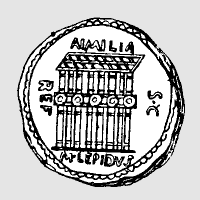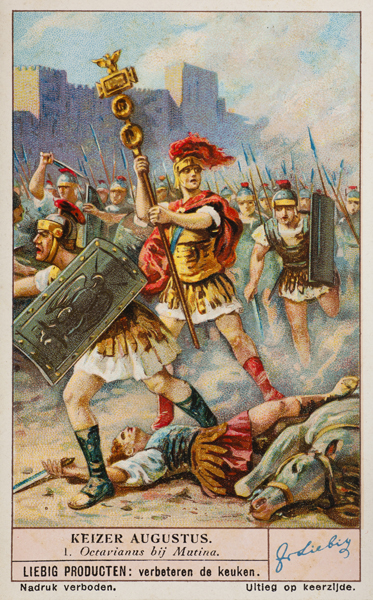|
Quintus Pedius (consul)
Quintus Pedius ( – late 43 BC) was a Roman politician and general who lived during the late Republic. He served as a military officer under Julius Caesar for most of his career. Serving with Caesar during the civil war, he was elected praetor in 48 BC and was given a triumph for victories over the Pompeians during the civil war's second Spanish campaign. After Caesar's death, he joined with Caesar's heir Octavian and, with him, assumed suffect consulships in 43 BC in place of the ordinary consuls who had fallen in battle. He promulgated the ''lex Pedia'', which established courts in which Caesar's killers and allies thereof were convicted ''in absentia''. He died shortly after the start of the Second Triumvirate's proscriptions. Early life He was the son of his homonymous father and his wife, Julia. This Julia was one of the dictator Julius Caesar's sisters, making this Pedius one of Caesar's nephews. Pedius served under Julius Caesar during the Gallic Wars starti ... [...More Info...] [...Related Items...] OR: [Wikipedia] [Google] [Baidu] |
Quintus Pedius Poplicola
Quintus Pedius Poplicola or Publicola ( first century BC) was a Roman who came from a Roman senatorial family. Biography Early life Publicola was the son of the noblewoman Valeria, one of the sisters to the senator Marcus Valerius Messalla Corvinus, thus was a daughter of Marcus Valerius Messalla Niger and his wife, Polla. His father may have been the Quintus Pedius who was nephew or great nephew of dictator Gaius Julius Caesar. His cognomen Publicola or Poplicola means in Latin "friend of the people". His mother named him this cognomen in honor of her step father consul Lucius Gellius Publicola and also the name Publicola is a cognomen that appears in Valeria's paternal ancestry, the gens Valeria. Valeria has various paternal ancestors with the cognomen Publicola. Career Very little is known on Publicola's life. He may have been quaestor in 41 BCAn inscription of this year (''CIL'' 6, 358) names a ''Quintus Pedius'' as urban quaestor: ''P(ublio) Servilio L(ucio) Antonio co(n)s( ... [...More Info...] [...Related Items...] OR: [Wikipedia] [Google] [Baidu] |
Marcus Caelius Rufus
Marcus Caelius Rufus (died 48 BC) was an orator and politician in the late Roman Republic. He was born into a wealthy equestrian family from Interamnia Praetuttiorum, on the central east coast of Italy. He is best known for his prosecution of Gaius Antonius Hybrida in 59 BC. He was also known for his trial for public violence (''de vi publica'') in March 56 BC, when Cicero defended him in the extant speech '' Pro Caelio'', and as both recipient and author of some of the best-written letters in the ''ad Familiares'' corpus of Cicero's extant correspondence (Book 8). He may be the Rufus named in the poems of Catullus. Life and career In his twenties, Caelius became associated with Crassus and Cicero, while he was also briefly connected to Catiline and his conspiracy. Caelius first achieved fame through his successful prosecution in 59 BC of Gaius Antonius Hybrida for corruption. Antonius Hybrida had served as consul with Cicero for the year 63 BC, and his prosecution ... [...More Info...] [...Related Items...] OR: [Wikipedia] [Google] [Baidu] |
Marcus Valerius Messalla Corvinus
Marcus Valerius Messalla Corvinus (64 BC – AD 8 or c. 12) was a Roman general, author, and patron of literature and art. Family Corvinus was the son of a consul in 61 BC, Marcus Valerius Messalla Niger,Syme, R., ''Augustan Aristocracy'', p. 230f. and his wife, Palla. Some dispute his parentage and claim another descendant of Marcus Valerius Corvus to be his father. Valeria, one of his sisters, married Quintus Pedius, a maternal cousin to the Roman emperor Augustus. His great-grandnephew from this marriage was the deaf painter Quintus Pedius. Another sister, also named Valeria married Servius Sulpicius Rufus (a moneyer). Corvinus married twice. His first wife was Calpurnia, possibly the daughter of the Roman politician Marcus Calpurnius Bibulus. Corvinus had two children with Calpurnia: a daughter, Valeria Messalina, who married the Roman senator Titus Statilius Taurus, consul in AD 11; and a son called Marcus Valerius Messalla Messallinus, consul in 3 BC. His second ... [...More Info...] [...Related Items...] OR: [Wikipedia] [Google] [Baidu] |
Italy
Italy, officially the Italian Republic, is a country in Southern Europe, Southern and Western Europe, Western Europe. It consists of Italian Peninsula, a peninsula that extends into the Mediterranean Sea, with the Alps on its northern land border, as well as List of islands of Italy, nearly 800 islands, notably Sicily and Sardinia. Italy shares land borders with France to the west; Switzerland and Austria to the north; Slovenia to the east; and the two enclaves of Vatican City and San Marino. It is the List of European countries by area, tenth-largest country in Europe by area, covering , and the third-most populous member state of the European Union, with nearly 59 million inhabitants. Italy's capital and List of cities in Italy, largest city is Rome; other major cities include Milan, Naples, Turin, Palermo, Bologna, Florence, Genoa, and Venice. The history of Italy goes back to numerous List of ancient peoples of Italy, Italic peoples—notably including the ancient Romans, ... [...More Info...] [...Related Items...] OR: [Wikipedia] [Google] [Baidu] |
Marcus Aemilius Lepidus (triumvir)
Marcus Aemilius Lepidus (; 89 BC – late 13 or early 12 BC) was a Roman general and statesman who formed the Second Triumvirate alongside Octavian and Mark Antony during the final years of the Roman Republic. Lepidus had previously been a close ally of Julius Caesar. He was also the last '' pontifex maximus'' before the Roman Empire, and (presumably) the last '' interrex'' and ''magister equitum'' to hold military command. Though he was an able military commander and proved a useful partisan of Caesar, Lepidus has always been portrayed as the least influential member of the Triumvirate. He typically appears as a marginalised figure in depictions of the events of the era, most notably in Shakespeare's plays. While some scholars have endorsed this view, others argue that the evidence is insufficient to discount the distorting effects of propaganda by his opponents, principally Cicero and, later, Augustus. Family Lepidus was the son of Marcus Aemilius Lepidus (consul in ... [...More Info...] [...Related Items...] OR: [Wikipedia] [Google] [Baidu] |
Mark Antony
Marcus Antonius (14 January 1 August 30 BC), commonly known in English as Mark Antony, was a Roman people, Roman politician and general who played a critical role in the Crisis of the Roman Republic, transformation of the Roman Republic from a Constitution of the Roman Republic, constitutional republic into the autocratic Roman Empire. Antony was a relative and supporter of Julius Caesar, and he served as one of his generals during the conquest of Gaul and Caesar's civil war. Antony was appointed administrator of Italy while Caesar eliminated political opponents in Greece, North Africa, and Spain. After Assassination of Julius Caesar, Caesar's assassination in 44 BC, Antony joined forces with Lepidus, another of Caesar's generals, and Octavian, Caesar's great-nephew and adopted son, forming a three-man dictatorship known to historians as the Second Triumvirate. The Triumvirs defeated Caesar's killers, the ''Liberatores'', at the Battle of Philippi in 42 BC, and divided th ... [...More Info...] [...Related Items...] OR: [Wikipedia] [Google] [Baidu] |
Battle Of Mutina
The Battle of Mutina took place on 21 April 43 BC between the forces loyal to the Roman Senate, Senate under consuls Gaius Vibius Pansa and Aulus Hirtius, supported by the forces of Augustus, Caesar Octavian, versus the forces of Mark Antony which were besieging the troops of Decimus Junius Brutus Albinus, Decimus Brutus. The latter, one of Caesar's assassins, held the city of Mutina (present-day Modena) in Cisalpine Gaul. Six days earlier, the Battle of Forum Gallorum had ended with heavy losses on both sides and the mortal wounding of consul Pansa. Hirtius and Octavian then launched an attack on Antony's camp, seeking to break the siege. Amid bloody fighting, Hirtius was killed, leaving the army and republic leaderless. Octavian saw action in the battle, recovered Hirtius' body, and managed to avoid defeat. Decimus Brutus also participated in the fighting with part of his forces locked up in the city. Command of Hirtius' legions then devolved to Caesar Octavian. Decimus Brut ... [...More Info...] [...Related Items...] OR: [Wikipedia] [Google] [Baidu] |
Aulus Hirtius
Aulus Hirtius (; – 43 BC) was consul of the Roman Republic in 43 BC and a writer on military subjects. He was killed during his consulship in battle against Mark Antony at the Battle of Mutina. Biography He was a legate of Julius Caesar's starting around 58 BC and served as an envoy to Pompey in 50. It was reported that Hirtius dined with Caesar, Sallust, Oppius, Balbus and Sulpicius Rufus on the night after Caesar's famous crossing over the Rubicon river into Italy on 10 January 49 BC. During Caesar's Civil War he served in Spain; he may have been a tribune in 48, and in 47 was at Antioch. He was a praetor in 46 and governor of Transalpine Gaul in 45. After Caesar's assassination in March 44, Hirtius was deeply involved in the maneuvering between parties. Having been nominated for that post by Caesar, Hirtius and Pansa became consuls in 43. Initially a supporter of Mark Antony, Hirtius was successfully lobbied by Cicero, who was a personal friend, and switched his al ... [...More Info...] [...Related Items...] OR: [Wikipedia] [Google] [Baidu] |
Gaius Vibius Pansa Caetronianus
Gaius Vibius Pansa Caetronianus (died 23 April 43 BC) was consul of the Roman Republic in 43 BC. Although supporting Gaius Julius Caesar during the Civil War, he pushed for the restoration of the Republic upon Caesar’s death. He died of injuries sustained at the Battle of Forum Gallorum. Early career Pansa was the son of moneyer Gaius Vibius Pansa. One of the first members of the gens Vibia to achieve political success, he was a '' novus homo'' ("new man", or self-made man not born into the senatorial order) who rose through the ''cursus honorum'' as a result of his friendship with Julius Caesar, under whom he served in Gaul. Pansa hailed from Perusia (modern Perugia) and was of Etruscan descent, as indicated by his second cognomen '' Caetronianus'', and from a family which had been proscribed under Sulla. He was adopted by the moneyer Gaius Vibius Pansa. The luxurious villa-estate at Ossaia near Cortona was probably owned by him as part of the '' gens Vibia''. Pansa was ... [...More Info...] [...Related Items...] OR: [Wikipedia] [Google] [Baidu] |
Lucius Pinarius
Lucius Pinarius Scarpus (flourished 1st century BC) was a Roman who lived during the late Republic and the early Empire. He served as the Roman governor of Cyrene, Libya during the War of Actium. He was originally loyal to Mark Antony, but eventually switched sides and joined Octavian following the latter's victory at the Battle of Actium in 31 BC. Life According to Suetonius, Pinarius was a grandnephew of dictator Gaius Julius Caesar by one of his sisters, Julia Major. His cousins were the consul Quintus Pedius, Octavia Minor (the fourth wife of Triumvir Mark Antony), and Octavian (the future emperor Augustus). His father was a member of the '' gens Pinaria'', an ancient, distinguished family of patrician status. The family can be traced to the foundations of Rome. Various members of the gens served as priests and were among the first to serve as consuls in the republic. Little is known about Scarpus' early life. He is first mentioned in the ancient sources when Caesar was a ... [...More Info...] [...Related Items...] OR: [Wikipedia] [Google] [Baidu] |
Assassination Of Julius Caesar
Julius Caesar, the Roman dictator, was assassinated on the Ides of March (15 March) 44 BC by a group of senators during a Roman Senate, Senate session at the Curia of Pompey, located within the Theatre of Pompey in Ancient Rome, Rome. The conspirators, numbering between 60 and 70 individuals and led by Marcus Junius Brutus, Gaius Cassius Longinus, and Decimus Junius Brutus Albinus, stabbed Caesar approximately 23 times. They justified the act as a preemptive defense of the Roman Republic, asserting that Caesar's accumulation of lifelong political authority—including his perpetual dictatorship and other honors—threatened republican traditions. The assassination failed to achieve its immediate objective of restoring the Republic's institutions. Instead, it precipitated Caesar's posthumous Roman imperial cult, deification, triggered the Liberators' civil war (43–42 BC) between his supporters and the conspirators, and contributed to the collapse of the Republic. These ev ... [...More Info...] [...Related Items...] OR: [Wikipedia] [Google] [Baidu] |




